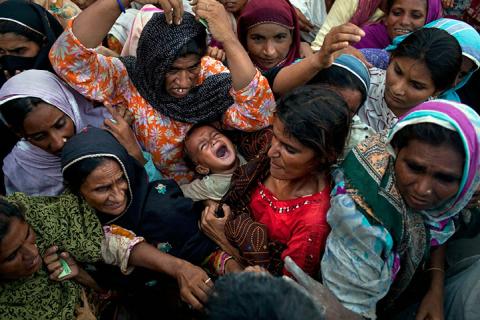Pakistan relief effort should anticipate mental aftershock

The horrific earthquake that struck Haiti in January this year dominated media headlines for several weeks. Newspapers and television were choc-a-bloc with images of people being rescued from the rubble and accounts of personal as well as reporting the obstacles encountered by those trying to deliver aid to the victims.
A little over six months has elapsed and there has been another major natural disaster. In this case, Pakistan has been ravaged by widespread flooding. Initial estimates calculate that repair of the structural damage will run to billions of US dollars. Over one million homes were destroyed and 20 million people – or roughly 12% of the local population - have been left homeless or been injured by the floods.
Mental Aftershock
In the swirl of humanitarian assistance that arrives in the wake of such disasters, the mental aftershock experienced by victims generally receives less attention than the physical reconstruction efforts. Initially, focus tends to be placed on repairing and rebuilding the country´s infrastructure and ensuring the provision of essential services such as potable water, safe sanitation facilities, adequate nutrition and shelter for the survivors.
Furthermore, whereas the physical damage is evident, the internal scars resulting from the traumatic experiences of those affected often remain hidden. The mental health needs of the affected population therefore frequently takes a backseat.
Acute and post-emergency support
The impact, severity and duration of mental health problems faced by survivors depend on a range of factors - the extent and nature of the disaster; pre-existing mental health problems and prior traumatic experiences; the loss of relatives, friends or personal property; extent of physical injuries suffered; and the existence or non-existence of family and community support.
According to Dr. Gerald Cohen, Director of Clinical Affairs for the NY Division of Mental Hygiene, disasters affect everybody involved, but in different ways. For some, the reaction may be mild, for others far more severe. While certain people experience an immediate reaction, mental health effects can also lie dormant for months or even years after the crisis.
The World Trade Center Registry revealed that approximately 25% of survey respondents, directly exposed to 9/11, recorded 'post traumatic stress symptoms' (PTSS) two to six years after the attack. Consequently, separate intervention strategies are needed for the acute emergency — immediate aftermath of the disaster— and post-emergency phases.
During the acute phase, the majority of mental health issues such as severe stress can be handled without medication. Mental health support generally consists of psychological first aid (PFA), involving non-invasive emotional support, preventing further harm or injury treatment of basic needs and arranging social support and networks. When feasible, these services should be located in the community.
Social interventions should continue during the post-emergency phase and mental health care be delivered through the general healthcare system. Efforts should be made to reduce the number of custodial mental health institutions and support provided to promote community and family care of persons with chronic mental health problems.
Integrated mental health support
Mental health programmes need to be incorporated into the overall relief effort, under general health. 'Stand-alone' services, concentrating on one particular mental health concern or category (rape victims, amputees, bereaved family members) risk creating a disjointed and uncoordinated system.
Mental health support services should use domestic structures including the school system, community bodies, religious and political leaders, the social, medical and mental health services, to obtain increased access to the local population. This will improve the sustainability of interventions and reduce potential 'stigmatisation' of mental health service users.
Mental health of relief workers
Working long hours in precarious security conditions, surrounded by misery, death and destruction and often lacking management and organisational back-up, relief personnel risk becoming emotionally and mentally drained. Experience has shown the most vulnerable humanitarian personnel are those who have been engaged in several successive assignments or who are on their initial deployment. Local staff are particularly at risk.
Basic psychological support, such as PFA, should be available to personnel who have directly experienced or observed potentially traumatic incidents.
Where performance is seriously impaired or a risk to themselves or others, humanitarian workers should be relieved of their duties and provided with immediate support by a mental health professional.
Need for further research
There is a growing demand for research on the optimal means of mental health support provision and the potential obstacles to so doing.
In order to address ethical concerns, regarding such research, the Working Group on Mental Health and Psychosocial Support in Crisis and Conflict convened by the Harvard Humanitarian Action Summit has produced a number of guidelines and recommendations.
A central tenet of its report is that there should be "no survey without service" and "no service without survey". This will help ensure that mental health support directly benefits the intended 'beneficiaries' while also contributing to future knowledge and best practices via research and evaluation findings grounded in implementation practice.
